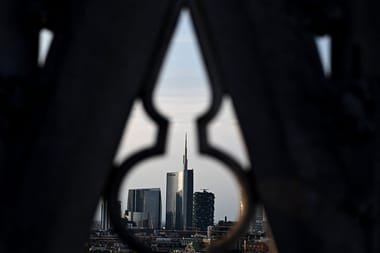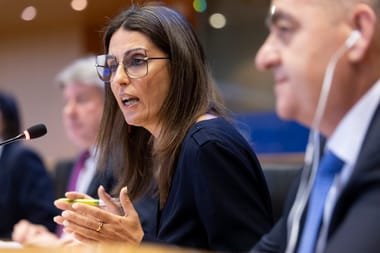UniCredit’s bid for BPM threatens to frustrate efforts to create a powerful new player in Italy’s banking market.

ROME — Call it a multi-bank pileup.
A sequence of takeover bids by UniCredit, Italy’s second-largest bank, has unleashed a financial war in the north of Italy, dividing Italian Premier Giorgia Meloni’s coalition and prompting it to consider the controversial use of executive powers to get its way.
The events have exposed the enormous influence the country’s biggest banks still wield over competing factions in the heart of government. They also demonstrate just how reluctant European leaders are to tolerate big deals in banking, even as Brussels calls for greater consolidation across Europe to make the sector fit for the future.
The brouhaha began in November, when Andrea Orcel, UniCredit’s ambitious dealmaking chief executive, bid to take over Lombardy-based lender Banco BPM, Italy’s fourth-largest bank, in an all-share deal worth €10.1 billion. If it went through, the deal would create Italy’s first trillion-euro banking group by assets.
The bid came as a surprise because UniCredit — which declined to comment for this story — had appeared preoccupied with a politically contentious move on Germany’s Commerzbank earlier in the year.
But the move on BPM angered major power players in Rome. In public, Matteo Salvini, leader of the hard-right League and Meloni’s junior coalition partner, worried it would lead to layoffs and branch closures and otherwise make UniCredit simply too big.
Behind the scenes, though, sources say the real reason for Salvini’s opposition was his hope of creating a “third pole” in the Italian banking system, built around BPM and incorporating Monte dei Paschi di Siena (MPS). Together, BPM and MPS would have around €340 billion in assets, while Intesa Sanpaolo has over €900 billion and UniCredit over €800 billion. The League has historic links to BPM, and a merger with MPS, traditionally allied with Italy’s left, would have been a rare coup.
Rome has been under pressure this year to meet an EU deadline for restoring MPS to the private sector after a big injection of state aid. After numerous false starts, it had sold blocks of MPS shares in November last year and then again in March. Last month it sold a tranche of 15 percent, bringing its own stake down to just below 12 percent.
Accordingly, UniCredit’s actions have riled the League badly.
“It took a lot of personal persuasion” to arrange the BPM-MPS deal, said one League lawmaker. The move by UniCredit was “like if someone had taken the Duomo of Milan and dirtied it with squatters and graffiti.”

As a result, people familiar with the matter suggest that the government, at the behest of the League, could exercise rights under its “golden power” — a screening tool typically used to reject foreign investment on national security grounds — to extract concessions from UniCredit. Such concessions might include asking the bank to offer guarantees against layoffs and branch closures, and potentially to sell off some of its smaller branches, the people said.
Traditionally, the golden power is deployed to protect a broadly defined “national interest,” with many EU countries using similar tools to stall or block takeover bids from foreign companies.
The government could, in this case, end up targeting one of Italy’s own banks, something that Michele Carpagnano, a partner at Dentons and head of think tank Osservatorio Golden Power, said would be unprecedented.
But Rome recognizes that blocking the deal outright would be legally difficult and could potentially undermine investor confidence.
“We have a duty of not frightening markets with extravagant choices,” Antonio Tajani, vice president of the council of ministers, told a hearing with lawmakers on Friday. “We are liberals, we are not going to meddle if a bank wants to buy another one, it’s the market that decides.”
Tajani is also national secretary of Forza Italia, the party founded by the late Silvio Berlusconi. Silvio’s heirs enjoy a close business relationship with UniCredit, choosing it, for example, to lead a €3.4 billion financing round that could fund a tie-up between their media empire and German broadcaster ProSiebenSat.1.
Supreme arbiters and white knights
The tension between the two junior coalition partners puts Meloni in an ideal position to arbitrate. But her own position remains a mystery.
Publicly, the prime minister has echoed Salvini’s concerns, also hinting at the use of the golden power. But counter-narratives abound: Some Italian media, for instance, have speculated, in extremely veiled terms, that Meloni herself encouraged UniCredit’s move — either to strengthen BPM against a possible foreign takeover, or even to undermine her coalition partner.
A further mystery, so far at least, is the role of construction tycoon Francesco Caltagirone, a canny strategist and ally of the premier, and of Delfin, the holding company controlled by the heirs of Leonardo Del Vecchio, the late founder of eyewear group Luxottica. Those two both took blocks of MPS shares in last month’s placement — a deal on which the government dispensed with its usual international advisers.
And in a crowning irony, for a deal dominated by factionalism within Europe’s most nativist, sovereigntist government, reports suggest Meloni is even willing to allow a foreign bank to act as a ‘white knight’ to derail UniCredit.
Days after UniCredit’s bid, French giant Crédit Agricole secured the rights to raise its own stake in BPM to 15.1 percent from 9.9 percent. It also asked for European Central Bank’s permission to raise it further to 19.99 percent.

Just as Orcel did with Commerzbank, Crédit Agricole has built a stake in BPM that forces any potential buyer to reckon with it. Unlike Orcel with Commerzbank, however, it has ruled out a full takeover, and is widely thought to be more concerned in defending its asset management business in Italy: UniCredit is currently the biggest local distributor for CA’s Amundi business, but that relationship could be threatened if UniCredit buys BPM, which is looking to take control of a rival asset management group, Anima.
German dimension
How the infighting in Rome plays out could also have big consequences for Orcel’s move on Commerzbank. That effort remains tied up with German supervisory authorities, and Commerzbank and Berlin insiders are watching the developments in Italy closely, one person familiar with the matter told POLITICO.
“The German perspective is, ‘If Orcel cannot push through BPM he’ll no longer have a job, so he will no longer be there to complete the job on Commerzbank,’” the person said. “And if he succeeds, BPM might be hard to digest quickly — so BPM is going to be the end of it.”
Paradoxically, anything that stops UniCredit taking over Commerzbank is welcome to some in Rome. The Finance Ministry declined to comment but, according to one well-connected Italian politician, some worry that a more pan-European UniCredit could be less interested in buying Italian government debt — an asset they feel it is UniCredit’s “patriotic duty” to hold.
Whether Orcel — for whom the shareholders have always come first — will be able to summon much patriotic feeling given recent events is another question.





